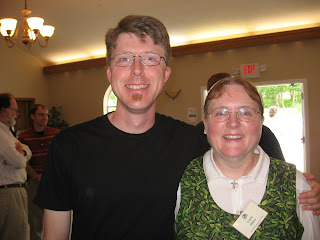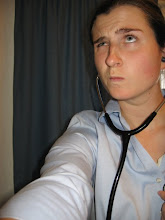I just finished my third week on outpatient medicine in Seattle. It has been so much fun, but I have been really busy (that is why I haven't posted as much recently). For outpatient medicine I am with a really nice girl named Ana that I actually know fairly well from my anatomy group. She is very smart and organized and is also very helpful and kind to every one around her - in short, a perfect person to have a rotation with. Our first day of the rotation was spent trying to get an ID badge - would you believe it took us 6 hours? I was joking that the id badges are so precious and take so long to get that if you got mugged on the way home from clinic you would probably say, "Take whatever you want, just PLEASE let me keep my hospital ID badge!" Maybe a little bit of an exaggeration, but not by much. :)
As far as what we do in the hospital on our outpatient rotation, we go from seeing patients in the primary care clinic to seeing patients in the ER (the medical side, not the surgery side), to observing physicians in the hematology/oncology clinic, to seeing patients in the renal clinic, etc. Some of the other really helpful clinics we observe/see patients in are the endocrine clinic, the movement disorder clinic (aka neurology), and the musculoskeletal rehab clinic. When we see our patients the sequence sort-of goes like this: We quickly review the chart and or the complaint that the patient is coming into address. Then our attending physician/teaching fellow introduces us to the patient and says, "Christine is a third year medical student and she is going to take a history on you and do a physical exam. Then she will present your case to me and we will come up with plan together." So you chat with the patient and collect the history of why they came into the hospital. Then you perform a focused physical exam - as pertains to the thing(s) the patient is complaining about. Then you take a few moments to collect your thoughts and present in about 3-5 minutes what the patient just spent a considerable amount of time collecting from the patient. At the end you tell your preceptor what you think the differential diagnosis is and what you plan for management is (this is the part that I am by far the weakest on right now). Then your preceptor/attending physician tells you all the things you missed or should have thought about and tells you the parts of your plan that are good or need improvement/more thought. You go back in with your attending physician and he/she checks some of your physical exam findings and asks a few questions and lets you present the plan to the patient. Then you or the attending put orders (such as tests, labs, etc) or consults into the computer which have to be signed by your attending doctor. Then you write up a "note" about the encounter including the history you took, the physical exam findings, and your assessment and plan. This may take 20minutes - a couple hours depending on how complicated things are and how clear your thought process is. Then the note goes to your attending physician who has to read it and sign it (and/or make corrections) before the note is finally part of the patient's file. Then sometimes you get to call the patient later on with the results of lab tests, etc. All-in-all, it is really interesting and a lot of fun. I learn so much everyday!!!
This last week I had patients that I got to see twice (so some continuity) it was nice to see how things were going with the medications that my preceptor and I suggested. It is also nice to get a taste of what it would be like if you were seeing the same patients over and over again if you were a real doctor. Last week I needed to ask some sensitive questions to a patient that I was seeing for the second time. I asked him if it was ok if I asked these questions and he responded with a huge smile and said, "Of course you can ask me that, you are my almost doctor person!" I is so amazing to me that someone considers me to be their "almost doctor." Wow, 3rd year is awesome! It is challenging, but by far, 10 times better than first and second year.
I will try to give up dates and stories as time and medical privacy laws allow.
Coming soon, from Pixar…
9 years ago


























